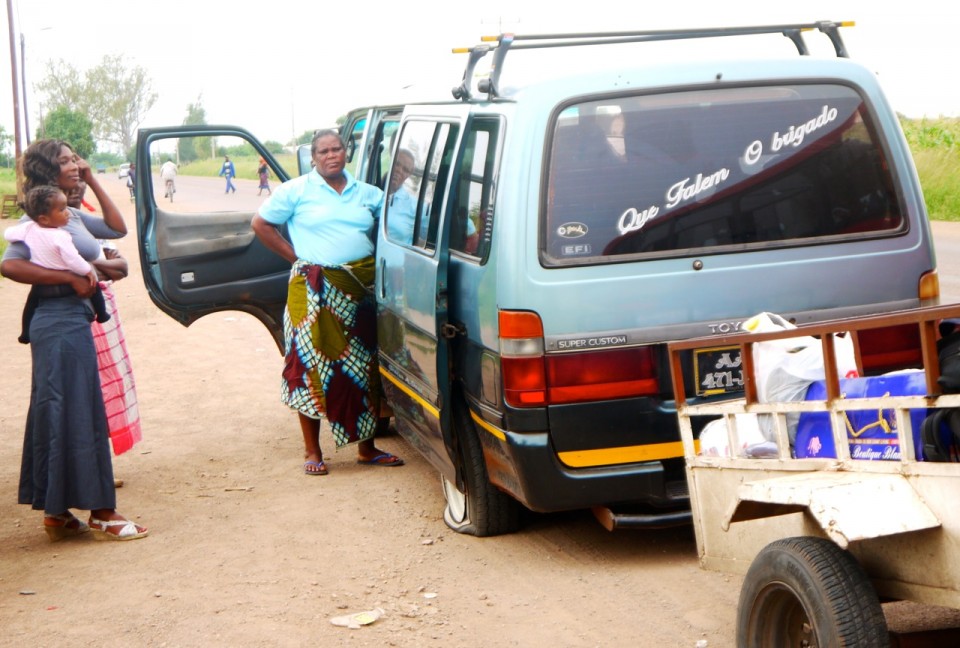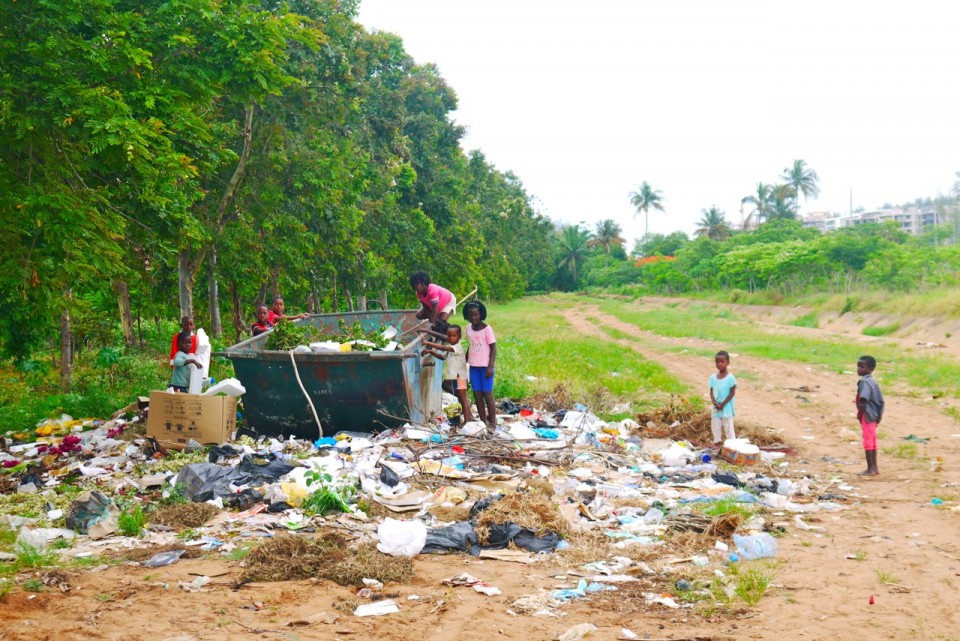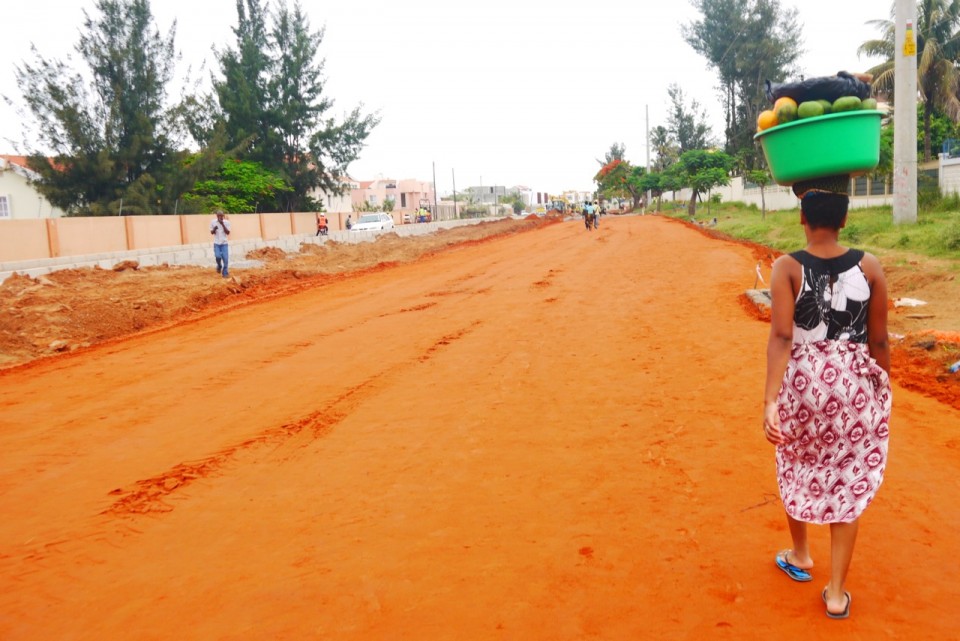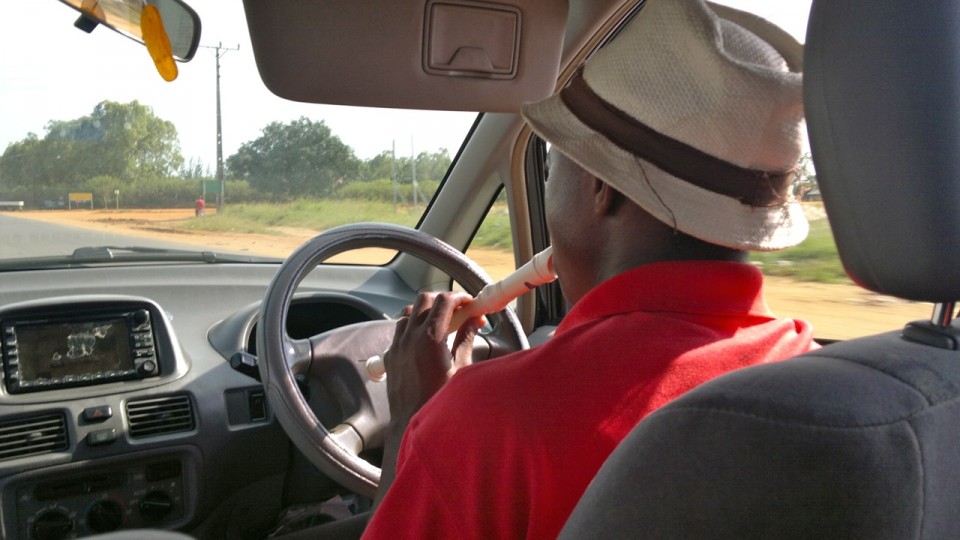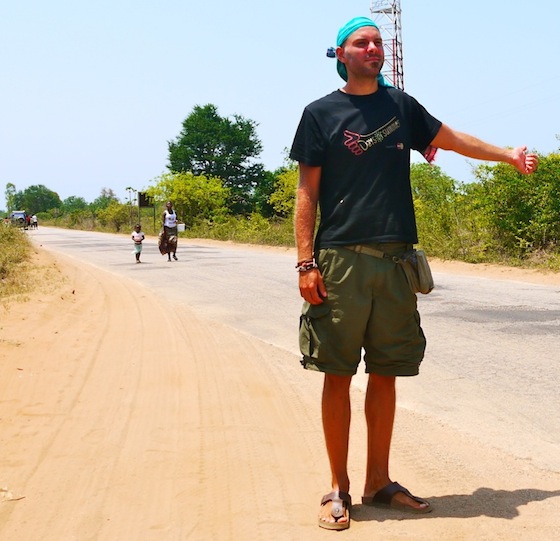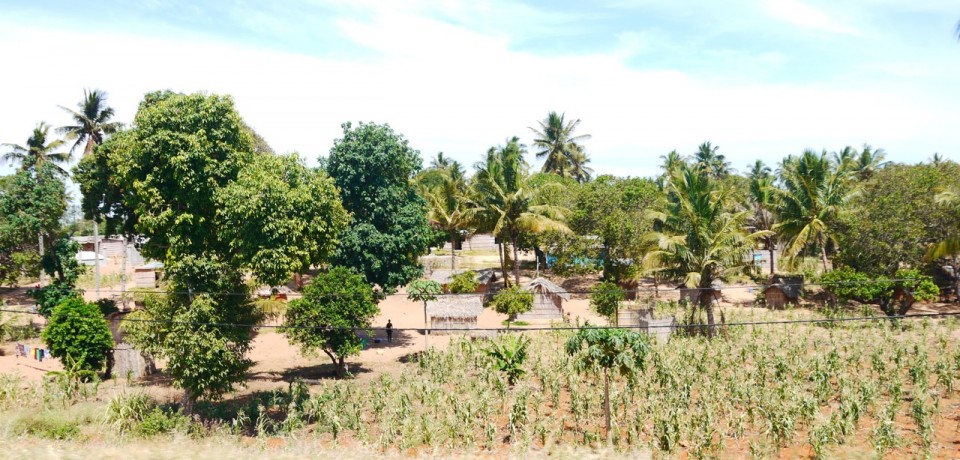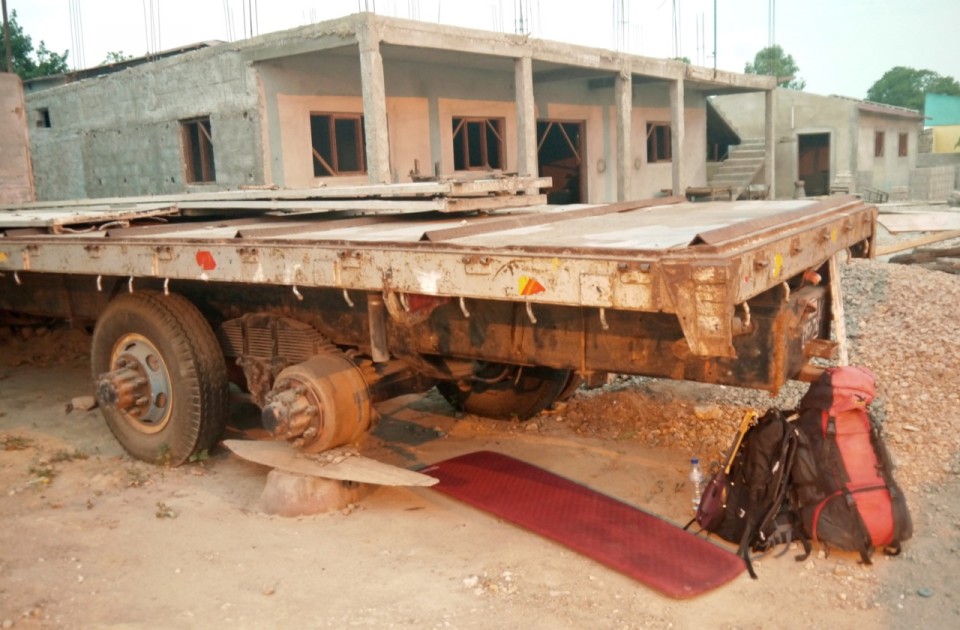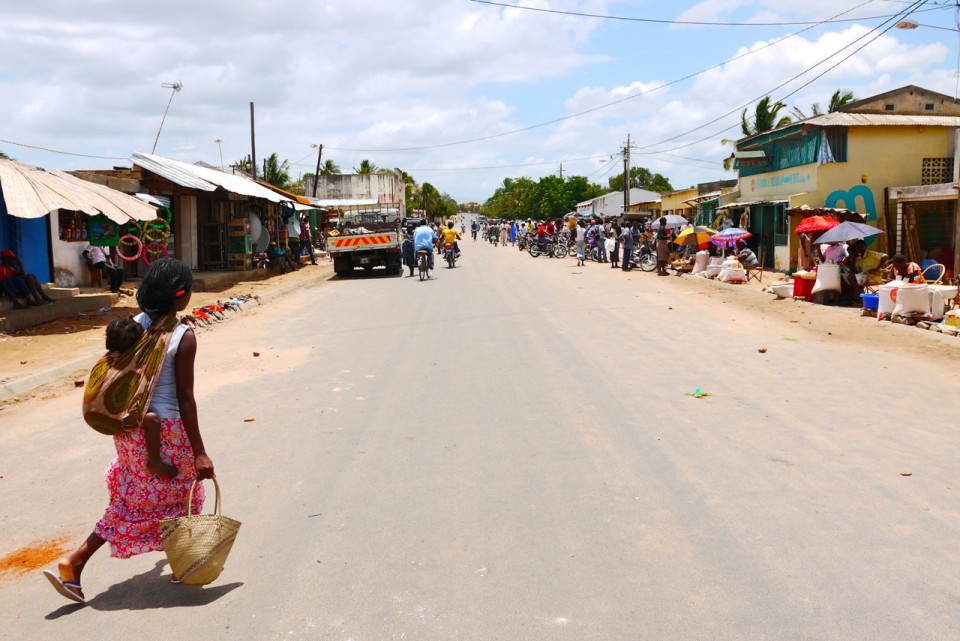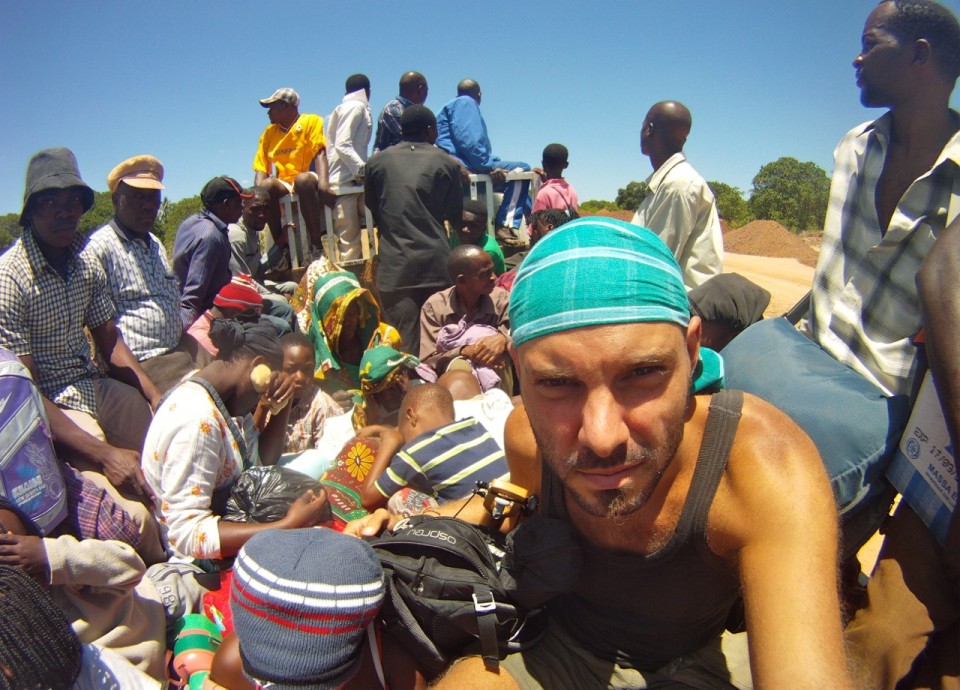I used a minibus for the following 70 kilometers or so overcrowded with pregnant ladies, women carrying babies instead of backpacks and smelly men who smelled a bit awkward to get from the border to Maputo. In the middle of the drive the tire got a puncture and I realized that in Africa it was much quicker, safer and more comfortable to – hitchhike.
While we were waiting for the driver to go to the nearby village to fix the tire I noticed that everyone was staring at me. It was nothing new to me: I got used to it in Asia, but I didn’t like it. One of my favorite things on my travels was fitting in: becoming similar to the local people, find my way in a new environment, be inconspicuous. In Asia, and obviously in Africa, that was mission impossible. You always got spotted, you were always special; you were always rich white tourist. Unless you stayed in one place for a longer period of time, like I did in the south of India. You get to learn a local language a bit, you dressed in the same way the local people do, you eat the local instead of the western food, you get acquainted to the local customs: those are the things I like. Maybe it was due to the fact that I don’t like travelling per se, but living in different places every now and then. Maybe I prefer settling down, not just passing by. Hmmm…
Was I doing what I really wanted to do? Or was I simply finishing something I’d already started? It was probably the combination of the two. If I didn’t have the project I was planning of completing I would probably go home. At least for a short period of time to calm down a bit, star a new project, spend more than a couple of days/weeks with people that are dear to me, no matter where.
There, those are the thoughts of a traveller on a depressive day. Luckily, there were surprisingly little of those days and they usually lasted till the moment I stopped thinking and simply let it go. The very same thing happened a few hours after that when I had a beer with my host from Maputo – a Brazilian Thiago. Good people and beer could always solve your problems.
I spent the following couple of days with Thiago drinking beers, eating, hanging out with his friends, met a girl from Ethiopia who found very amusing a joke about Ethiopians who were going hunting with two spears…You know that one?
Before getting there, I’d heard that Mozambique was expensive. I had to agree with it, yet again it all depended on the lifestyle you led: if your hosts ate in the restaurants, if you had beer in cafes, if you were going out…of course you had to pay for those things. Especially if for the past two months you were denuded of some earthly pleasures.
In Maputo, for the first time since I left Croatia, I watched a football game, the one between Porto and Dinamo. It was an interesting experience to watch it in a bar full of quasi Portuguese. It all came back to me, the old feelings: I remembered the important role Dinamo had on my first journeys. My first trip and first Couchsurfing experience was in 2007 in Amsterdam when Dinamo beat Ajax 3-2. It was a match to remember, however, I didn’t remember the match but everything that followed it in Amsterdam. That one-week stay in the capital of Netherlands (which I visited 5 or 6 times after that) marked the beginning of this kind of travelling.
I watched the match; I even swore when Sammir hit the crossbar. But, of course Dinamo soon was losing badly, so, with a smile on my face, I remembered why I’d stopped following football: the match with Turkey in the summer of 2008 was the turning point – there was no point in losing your nerves on stuff like that. Enjoy in victory – yes; crying over a defeat – no. The perfect combination.
A day after the defeat I started off a new quest: finding Malawian embassy. I got lost on the streets of Maputo: a few people spoke English, and I was ashamed of my Spanish, even though everyone understood me when I spoke Spanish, at least better than they understood English. Mozambique had been Portuguese colony since the 16th century and it became independent only some 40 years before. Up until the 90s it was a scene of bloody civil war, and now, even though the rate of poverty is still very high, the economy of Mozambique is characterised by one of the biggest economical growths in the world.
I finally found the embassy, cheerfully filled out some simple and non-demanding forms, but I couldn’t believe it when the counter-lady told me the price of the visa – 150$! The most expensive visa ever, and, ironically, it was for one of the poorest and least developed countries in the world.
I had a few options. The option number one: suck it up and pay a somewhat high amount of money to get another sticker in my passport. The option number two: take a risk and go the border without a visa and hope that I will succeed in bribing the customs officer so that he will let me enter Malawi. The option number three – skip Malawi.
I didn’t feel like taking a risk or skipping anything that day so I went to an ATM, got the money I needed from my MasterCard, changed the money to dollars and returned to the embassy. The good news was that the visa would be issued in 24 hours. When you consider that I would pay 150 $ they should’ve given issued it right away!
While I was stealing a bit of wireless Internet in a local bar I met a guy who approached me the moment he noticed the Couchsurfing sticker on my l laptop. We started talking, he offered me his company for the rest of the day and I accepted his offer immediately. We drove in his car to the suburbs of the city where his family lived, and after that we ended up in barber shop where I lost my three-month beard and I finally looked like a youngster.
Also, while taking a stroll I noticed that the local people weren’t much fond of the white people with cameras. They would wave with their hands and start shouting even before you started taking any photo. I felt like peeping Tom: as if I was sticking my nose up in their not so beautiful reality which they didn’t want to share with anyone. Since no one gave me the permission for doing it, I stopped being peeping Tom. The exception were rare cases when people actually ask me take a photo of them or when I managed to do it when they weren’t watching.
With a Malawian visa in my passport (I had only seven blank pages left) I had nothing else to do in Maputo so I decided to go on. Since I still remembered the uncomfortable ride from the border I decided to hitchhike to Maxixe, which was almost 500 kilometres far from Maputo: I had a CS host there. It only took me 7 hours and five different vehicles to get there. No one asked me to give any money for the ride.
In Maxixe I was welcomed by Nelio who was quite busy and didn’t seem much interested in hanging out. That evening I took a walk by myself and decided that I wouldn’t stay there much longer despite the fact that Tofo, the most known tourist destination in Mozambique, was only a few kilometres away. Nice beaches, beer, sea and everything that goes along with it. Given the fact that I’d seen a lot of it in the past couple of months and I wasn’t interested in spending another day with a not so interested host, without any feelings of guilt, the following morning I got up and went northwards.
As always, I didn’t stick out the thumb when I saw the minivans passing by, but I concentrated on the personal vehicles. Despite my tactics nearly every van pulled over but I just kept waving away. Just as I was about to dehydrate due to the heat, a car pulled over. The car was new, comfortable unlike all the cars I’d been into while in Africa. With a smile on my face I told him that I was going to Mocuba that was 1200 kilometres away, where I was supposed to meet a Finish girl who would be my CS host. In his bad English the driver told me that he could only give me a ride for some 600 kilometres and that it would cost me one hundred money. Since I’d already knew that a ride in Mozambique was 1 money per kilometre I jumped in, fastened my seat belt and at an approximate speed of 130 km/h we headed towards north.
The driver’s English was quite bad, however, we managed to exchange a few words. I watched the kids selling some cashew nuts by the road, overloaded trucks and the green environment.
After a few hours of fast driving, we made a stop at a gas station where the driver motioned me to give him the money so he could pour the gas. Very generously I gave him 110 moneys but there was something wrong. The driver started grudging, waving his arms and using his finger he wrote the number 1000 on the car window and kept on saying hundred, hundred. It was clear to me straight away that there had been a misunderstanding due to his ignorance of English: he mixed ‘thousand’ with ‘hundred’.
I told him I was sorry, but that it was his mistake: we made a deal to pay one hundred, and that was exactly I was going to pay him. Even he realized that he was wrong, so he kept silent with his head bowed, and I thanked him for the ride, took my backpack and left his car. After some time he called me back to get into the car, but I felt that the situation was a bit awkward so I thanked him once again, and said that I was sorry but I refused the offer.
In the middle of nowhere, the thumb was up again.
A couple of cars pulled over but they asked me too much money, however, after them a man pulled over who agreed on giving me the ride nearly all the way to my destination and he asked me only 200 moneys. His English was way better than my last driver’s one so I didn’t have to worry whether he knew the difference between hundred and thousand.
As we went on, there were more and more bumps on the road and I was informed that the driver had been on road for the past 14 hours and that he was exhausted. He was complaining that he was tired and sleepy so I took over the role of entertainer: I asked him all bunch of things, told him the stories of my own and kept on changing the songs on the radio – everything to keep him awake.
At the end my plan worked and at midnight we arrived to Nicoadala, which is some 100 kilometers away from Mocuba. The streets were dusty; there was no street-light: the only sound was coming from a local bar and it was some local melody. Following the driver’s instructions I avoided the curious looks of the passengers with a beer in their hands and I found a police station. I got acquainted with the guard, noticed a broken-down truck whose side-car was meant for me to put my self-inflating mattress.
In the middle of the night I was awaken by a soft drizzle so I moved myself under the side-car and, except for a curious dog there were no other disturbance during the night.
Tired of the being on the road the whole day I got onto the first bus to Mocuba the next morning, my final destination in Mozambique. Since I had to wait for my Finish host to get her job done I wandered through the village with a backpack on my back, found the only restaurant that was open and had my breakfast. However, the breakfast was nowhere to be seen. All I could do was order the other food product that was on the menu and it was a drink.
As I got drunk early in the morning I soon got sleepy. I wasn’t picky, especially since I’d spent the last night under a side-car, so I found an abounded house by a road where I blew up my mattress and dozed off a little. I was waken up after an hour by the voices of the local people who, with no bad intentions, wanted to know who I was and what brought me there. Sleepy, still half drunk and with a hangover all at the same time I did my best to be a good guest and answer all their questions. Sunburnt I set off to the mission of finding my host. I managed to find her and we only continued from where I’d stopped a few hours before – we had a beer.
I spent the following few days in the rainy Mocuba, taking walks, talking to my host, eating and drinking; nothing particularly interesting.
I began thinking about the same thing – what was I doing in Africa?
I was completely clueless.
I left Mocuba and headed towards Malawi. I tried to hitchhike, not because I didn’t want to pay for the ride, but simply because I didn’t feel like using the public transportation: trucks that were in terrible state overcrowded with people and in those you were supposed to drive for 200 kilometers to the border. I managed to count up to 40 people driving in the first one which passed by me. The number was the same in the fourth truck on which I got also after two hours of hoping that at least one car would pass which was going my way. Didn’t happen.
It took us nearly eight hours to get to the border. The truck broke down twice, and we stopped at least some 50 times so the passengers could get on/off the truck. I was patient and carefree. Obviously the time I had to wait on the Pakistani/Iranian border (78 hours + 41 hours of driving after that) had left a mark on me; a positive one, of course. Few are the things that could kick me out of my shoes and make me nervous. Long and uncomfortable rides are no longer one of those things.
I arrived to the border in the nick of time, just ten times before it was to be closed. That was the fourth country I was entering in the past two weeks.
Somehow I felt a bit gloomy in the Africa; without the will to do anything; quick. Who knows, maybe in Malawi I will manage to find the peace…
—
GALLERY – RSA, SWAZILAND, MOZAMBIQUE.
—
YT VIDEO – RSA, SWAZILAND, MOZAMBIQUE:
